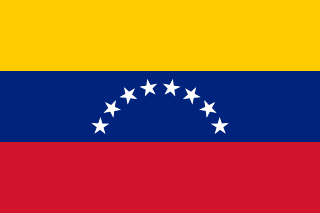
Venezuela, officially the Bolivarian Republic of Venezuela, is a country on the northern coast of South America, consisting of a continental landmass and many islands and islets in the Caribbean Sea. Venezuela comprises an area of 916,445 km2 (353,841 sq mi), and its population was estimated at 29 million in 2022. The capital and largest urban agglomeration is the city of Caracas.

The economy of Venezuela is based primarily on petroleum. Venezuela is the 25th largest producer of oil in the world and the 8th largest member of OPEC. Venezuela also manufactures and exports heavy industry products such as steel, aluminum, and cement. Other notable manufacturing includes electronics and automobiles as well as beverages and foodstuffs. Agriculture in Venezuela accounts for approximately 4.7% of GDP, 7.3% of the labor force and at least one-fourth of Venezuela's land area. Venezuela exports rice, corn, fish, tropical fruit, coffee, pork and beef. Venezuela has an estimated US$14.3 trillion worth of natural resources and is not self-sufficient in most areas of agriculture. Exports accounted for 16.7% of GDP and petroleum products accounted for about 95% of those exports.
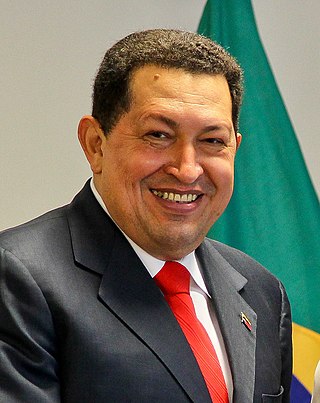
Hugo Rafael Chávez Frías was a Venezuelan politician and military officer who served as president of Venezuela from 1999 until his death in 2013, except for a brief period of forty-seven hours in 2002. Chávez was also leader of the Fifth Republic Movement political party from its foundation in 1997 until 2007, when it merged with several other parties to form the United Socialist Party of Venezuela (PSUV), which he led until 2012.

Caracas, officially Santiago de León de Caracas (CCS), is the capital and largest city of Venezuela, and the center of the Metropolitan Region of Caracas. Caracas is located along the Guaire River in the northern part of the country, within the Caracas Valley of the Venezuelan coastal mountain range. The valley is close to the Caribbean Sea, separated from the coast by a steep 2,200-meter-high (7,200 ft) mountain range, Cerro El Ávila; to the south there are more hills and mountains. The Metropolitan Region of Caracas has an estimated population of almost 5 million inhabitants.

Simón José Antonio de la Santísima Trinidad Bolívar Palacios Ponte y Blanco was a Venezuelan military and political leader who led what are currently the countries of Colombia, Venezuela, Ecuador, Peru, Panama and Bolivia to independence from the Spanish Empire. He is known colloquially as El Libertador, or the Liberator of America.
The bolívar is the official currency of Venezuela. Named after the hero of Latin American independence Simón Bolívar, it was introduced following the monetary reform in 1879, before which the venezolano was circulating. Due to its decades-long reliance on silver and gold standards, and then on a peg to the United States dollar, it was considered among the most stable currencies and was internationally accepted until 1964, when the government decided to adopt a floating exchange rate instead.

The National Assembly is the legislature for Venezuela that was first elected in 2000. It is a unicameral body made up of a variable number of members, who were elected by a "universal, direct, personal, and secret" vote partly by direct election in state-based voting districts, and partly on a state-based party-list proportional representation system. The number of seats is constant, each state and the Capital district elected three representatives plus the result of dividing the state population by 1.1% of the total population of the country. Three seats are reserved for representatives of Venezuela's indigenous peoples and elected separately by all citizens, not just those with indigenous backgrounds. For the 2010 to 2015 the number of seats was 165. All deputies serve five-year terms. The National Assembly meets in the Federal Legislative Palace in Venezuela's capital, Caracas.

The Venezuela national football team represents Venezuela in men's international football and is controlled by the Venezuelan Football Federation (FVF), the governing body for football in Venezuela. They are nicknamed La Vinotinto. When playing at home in official games, they usually rotate between three stadiums: The Polideportivo Cachamay in Puerto Ordaz, the Estadio José Antonio Anzoátegui in Puerto La Cruz and the Estadio Pueblo Nuevo in San Cristóbal. In friendly matches, they tend to rotate between the rest of the stadiums in the country.

The Miss Venezuela is the national beauty pageant of Venezuela, traditionally held in September. It is preceded by two or three months of preliminary events, with the awarding of corporate prizes. The final televised competition generally lasts about four hours and is broadcast live across Latin America by Venevisión and produced by the networks parent company Cisneros Group, with edited versions to the United States and Mexico on the Univision and Telemundo networks. From 2013 to 2015, the national contest was split into two separate pageants: Miss Venezuela and Miss Venezuela Mundo. The pageant is also closely observed by other countries seeking to level competition due to its illustrious record of pageant victories. In 2016, the Venezuelan franchise for Miss Earth was awarded to Miss Earth Venezuela organized by National Directors Julio César Cruz and Alyz Henrich.

The Bolivarian Republic of Venezuela is a federation made up of twenty-three states, a Capital District and the Federal Dependencies, which consist of many islands and islets in the Caribbean Sea. Venezuela also claims the Guayana Esequiba territory which comprises six districts in the independent nation of Guyana.
Venezuelan cuisine is influenced by its European, West African, and indigenous traditions. Venezuelan cuisine varies greatly from one region to another. Food staples include corn, rice, plantains, yams, beans and several meats. Potatoes, tomatoes, onions, eggplants, squashes, spinach and zucchini are also common side dishes in the Venezuelan diet. Ají dulce and papelón are found in most recipes. Worcestershire sauce is also used frequently in stews. Venezuela is also known for having a large variety of white cheese, usually named by geographical region.
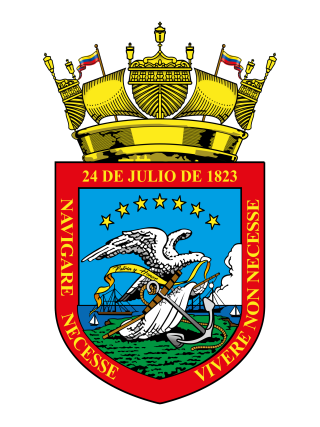
The Bolivarian Navy of Venezuela, commonly known as the Venezuelan Navy, is the naval branch of the National Bolivarian Armed Forces of Venezuela.
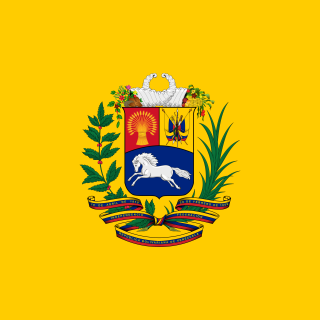
The president of Venezuela, officially known as the President of the Bolivarian Republic of Venezuela, is the head of state and head of government in Venezuela. The president leads the National Executive of the Venezuelan government and is the commander-in-chief of the National Bolivarian Armed Forces. Presidential terms were set at six years with the adoption of the 1999 Constitution of Venezuela, and presidential term limits were removed in 2009.

Guayana Esequiba, sometimes also called Esequibo or Essequibo, is a disputed territory of 159,500 km2 (61,600 sq mi) west of the Essequibo River that is administered and controlled by Guyana but claimed by Venezuela. The boundary dispute was inherited from the colonial powers and has been complicated by the independence of Guyana from the United Kingdom in 1966.

Nicolás Maduro Moros is a Venezuelan politician who has served as the president of Venezuela since 2013.

Relations between Cuba and Venezuela were established in 1902. The relationship deteriorated in the 1960s and Venezuela broke relations in late 1961 following the Betancourt Doctrine policy of not having ties with governments that had come to power by non-electoral means. A destabilizing factor was the Cuban support for the antigovernment guerrilla force that operates in remote rural areas. Venezuela broke off relations with Cuba after the Machurucuto invasion in 1967, when Cuban trained guerrillas landed in Venezuela seeking to recruit guerrillas and overthrow the government of Raúl Leoni. Relations were reestablished in 1974.

Gran Colombia, or Greater Colombia, officially the Republic of Colombia, was a state that encompassed much of northern South America and part of southern Central America from 1819 to 1831. It included present-day Colombia, mainland Ecuador, Panama, and Venezuela, along with parts of northern Peru, northwestern Brazil, and Guyana. The terms Gran Colombia and Greater Colombia are used historiographically to distinguish it from the current Republic of Colombia, which is also the official name of the former state.

An ongoing socioeconomic and political crisis began in Venezuela during the presidency of Hugo Chávez and has worsened during the presidency of his successor Nicolás Maduro. It has been marked by hyperinflation, escalating starvation, disease, crime and mortality rates, resulting in massive emigration from the country.

Juan Gerardo Guaidó Márquez is a Venezuelan opposition politician. He belonged to the social-democratic party Popular Will, and was a federal deputy to the National Assembly representing the state of Vargas. On 23 January 2019, Guaidó and the National Assembly declared that he was acting president of Venezuela, starting the Venezuelan presidential crisis by challenging Nicolás Maduro's presidency. In December 2022, opposition parties voted to dismiss Guaidó as interim president, choosing Dinorah Figuera as a successor on 5 January 2023 and ending Guaidó's presidential claim.
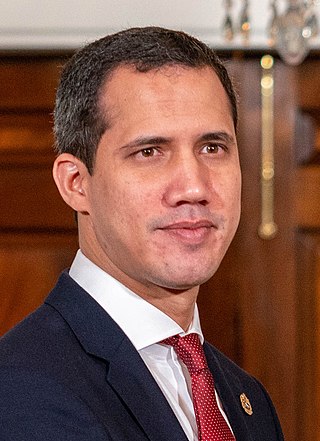
The Venezuelan presidential crisis was a political crisis concerning the leadership and the legitimate president of Venezuela between 2019 and 2023, with the nation and the world divided in support for Nicolás Maduro or Juan Guaidó.


















